Our programmes are delivered with great flexibility, to adapt them to learning contents, desired learning outcomes, and participant profiles. Here are the most common learning formats we are using at SMU Executive Development.
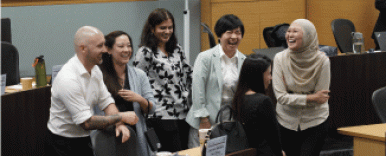
Project-Based Learning
Project-based learning allows participants to work in teams for a common goal and often stretches over days or weeks, both on-site and back in the home office, all under experienced supervision by coaches. Project-based learning is extremely effective to teach a capstone-like capability to pull all necessary elements for problem-solving together into one project. When the project derives from the client company itself, the project becomes all the more relevant to participants and the outcome can be used immediately back at the company.
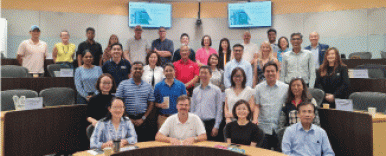
Classroom Delivery
The executive classroom “face-to-face” format is still our most popular format. Conducted in our own facilities with tiered executive theatres and breakout rooms for group work, this format is suitable for rapid content transmission for up to 60 participants at one time. This format works best when the desired learning outcome depends on absorbing much content in a short time, when co-location is possible and desired, and when there are numerous participants with similar background profiles.
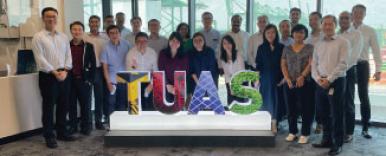
Site Visits
Company and site visits are a great way to learn how industry players organise and operationalise their work. This is insightful for participants as they experience first hand how businesses apply and translate what was taught in the classroom into the real world.
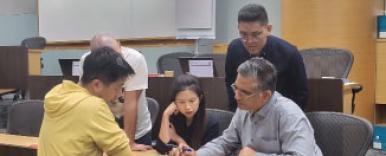
Business Simulation
Business simulations in the classroom or online convey the dynamics and complexity of the real world in a game-like environment with rules, yet that is not under full control of the participants. This format requires variable levels of background from the participants, and typical outcomes include the experience that theory often does not translate easily into practice. Simulations are a type of experiential learning and can vary in complexity from easily accessible board games to full-blown spreadsheet based corporate dealings.
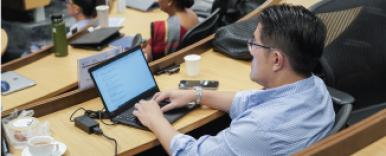
Online and Mobile Learning
For an online experience, we can deliver content electronically to you. We offer content on various mobile micro-learning platforms, and desktop-based learning management systems (LMS). Both mobile and PC based LMS can be used as standalone or for blended learning. In blended learning, participants still come to face-to-face sessions in the classroom but receive contents, readings, updates, refreshers, assignments, or quizzes, through electronic means, either before, during, or after the classroom sessions. Mobile micro-learning is a great way to engage participants in a playful way, often on the go. It allows to consume learning in bite-sized chunks, to give feedback, and provides interactivity through uploads of posts, assignments, pictures and videos via handphones.

Scenario Building Case Studies
For more practical teaching and a learning outcome that includes real-life examples, case studies are a great way to study what happened to certain companies in certain situations. Here, the content is specific to a very special situation. While it is more concrete, it requires participants that can extrapolate from the specific to the general, and use analogies.
Scenarios are another way to get at life-like situations. Scenario building is an art that can be learned, in order to construct “what-if” possible futures in the face of uncertainty. Scenarios can be done in class with supervising faculty, or off-site.

Assessment
Before any programme, we conduct pre-assessments of the learning needs. We do this through discussions with senior executives, corporate HR departments, or requests for proposal for entire company programmes. We can use customized personal assessments in order to find out what learning is most needed. Post-assessments after programmes have been delivered, can assess the progress achieved.
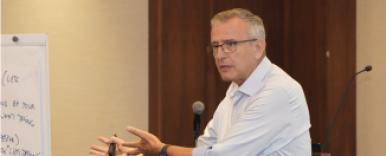
Storytelling
In storytelling, the participants build a virtual project by building and delivering compelling stories to learn how to translate goals into engaging sharing. In debates, industry experts or own corporate executives sit as moderators while participants work in teams to spar over divisive issues – a great way to bring sensitive issues to the fore in a playful context.
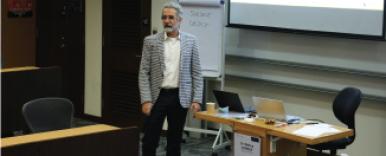
Executive Coaching
Finally, coaching: This most personal way to learn something about oneself can be used in conjunction with assessments of capabilities or psychometric dimensions, or as a standalone to modify behaviour in the most individually bespoke manner.

Webinar
The online variant of the classroom is the live webinar. Here, faculty and participants come together in audio or video session, often in-between classroom face-to-face delivery sessions, in order to prepare for the next session, or reinforce past content.

Fireside Chats with Leading Industry Practitioner
For sharing of the top level executive experience, fireside chats with leading industry practitioners enliven the more advanced senior management courses. Here, participants don’t go to the company, the company executive comes to them.